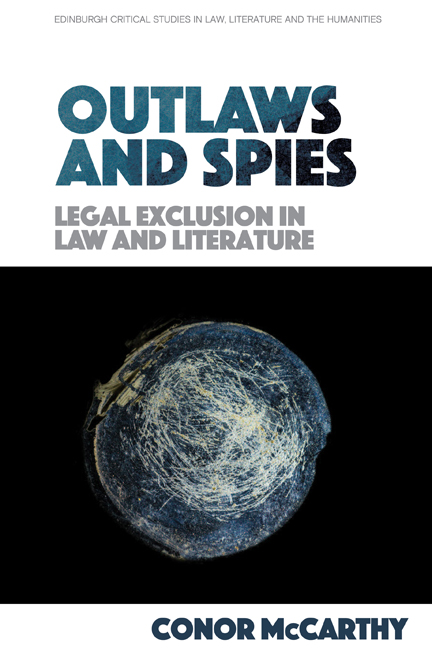Book contents
- Frontmatter
- Contents
- Acknowledgements
- Introduction
- 1 Outside the Law in the Middle Ages
- 2 Sovereign Outlaws: Shakespeare’s Second Tetralogy
- 3 The Endurance of Exclusion: Versions of Ned Kelly
- 4 ‘We’re Not Policemen’: Espionage and Law in John le Carré
- 5 ‘All Plots Tend to Move Deathward’: Plots and Consequences in Don DeLillo
- 6 Unanswered Questions: Ciaran Carson
- 7 Contesting the Virtual: William Gibson
- Conclusion
- Bibliography
- Index
3 - The Endurance of Exclusion: Versions of Ned Kelly
Published online by Cambridge University Press: 08 October 2020
- Frontmatter
- Contents
- Acknowledgements
- Introduction
- 1 Outside the Law in the Middle Ages
- 2 Sovereign Outlaws: Shakespeare’s Second Tetralogy
- 3 The Endurance of Exclusion: Versions of Ned Kelly
- 4 ‘We’re Not Policemen’: Espionage and Law in John le Carré
- 5 ‘All Plots Tend to Move Deathward’: Plots and Consequences in Don DeLillo
- 6 Unanswered Questions: Ciaran Carson
- 7 Contesting the Virtual: William Gibson
- Conclusion
- Bibliography
- Index
Summary
If enforcing the law in the medieval period often meant resorting to exclusion outside it, long after the autumn of the Middle Ages fugitives from justice continued to defy the law. Some of these fugitives were simply criminals: England boasts a tradition of highway robbers into the late eighteenth century, Dick Turpin being the most famous, who remain the subject of nineteenth-century nostalgia. In other instances, banditry emerges from a context of broader conflict. In seventeenth-century Ireland, the bandits known as ‘tories’ and ‘rapparees’ are active in the aftermath of the Irish Confederate Wars. Two centuries later on the other side of the Atlantic, Jesse James starts out serving with the guerrilla group known as Quantrill's Raiders during the American Civil War, and Billy the Kid's career takes place against the backdrop of the New Mexico factional conflict known as the Lincoln County War.
To a certain extent, outlawry endures less as a legal practice than as a cultural phenomenon, for the word ‘outlaw’ has both a legal and a figurative sense. Legally, an outlaw was a person declared to be outside the law and deprived of its benefits and protection. Figuratively, a person living without regard for the law, and particularly a fugitive from justice, might also be described as an outlaw, while not formally meeting the legal definition.
The Constitution of the United States did not either endorse or forbid outlawry, but outlawry was allowed in the constitutions of several individual states. Outlawry remained legal in New York, Pennsylvania and North Carolina into the 1970s: North Carolina outlawed an escaped prisoner in 1960. For the most part, however, states began to abolish outlawry in the aftermath of the Civil War. Mostly, then, the term is used of the American West not to describe individuals formally placed outside legal protection, but rather notorious fugitives from justice, few of whom were ever formally outlawed. However, the common law power of posse comitatus was used to mobilise citizens alongside lawmen in pursuit of criminals, and was often construed to authorise widespread manhunts.
- Type
- Chapter
- Information
- Outlaws and SpiesLegal Exclusion in Law and Literature, pp. 80 - 106Publisher: Edinburgh University PressPrint publication year: 2020



